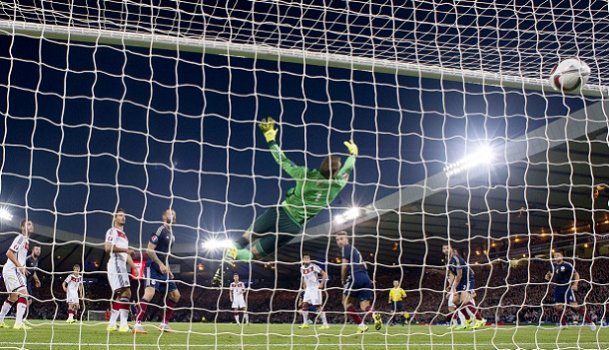Craig Cairns casts his eye over Monday night’s Euro 2016 qualifier between Scotland and Germany at Hampden, which the world champions won 3-2.
The obvious question to ask after such a valiant showing against a side that won the World Cup little over a year ago, is why didn’t Scotland put in the same level of performance against an inferior Georgia? The truth is that Scotland’s recent form has not been built upon technically-gifted midfielders unlocking tight, nine-man defences. Sure, Scotland are a more comfortable side in possession under Gordon Strachan but their success is a result of hard work, a solid defence and hitting on the break. Over 23 matches, Strachan’s side have recorded seven 1-0 victories.
Scotland also score more frequently under Strachan. In fact, Friday was the first time in almost two years that they have failed to score in a match. Conditions, an off night or whatever, Scotland recorded their first truly poor result of the campaign. The frustration is perhaps more with the familiarity of the result that blemished an, until then, positive run of results.
Germany’s full-backs
Even before this match, Germany’s performance at home to Poland on Friday displayed their vulnerability in defence, especially given the way they commit players forward. For the reasons mentioned above, this was always going to suit Scotland. Since earning their status as world champions, Germany have had issues in the full-back areas, not least after the retirement of Philipp Lahm. Emre Can and Jonas Hector were selected to face Scotland and both tried their best not to play like full-backs, pushing the Scotland midfield and defence deep and narrow. So deep and narrow that it sometimes looked as if Scotland were playing a 6-3-1 formation with four central defenders flanked by Shaun Maloney and James Forrest at full-back.
When in possession, James Morrison was the closest central player to lone striker Steven Fletcher, but would drop to the right of a flatter three with Scott Brown and James McArthur to protect the defence. Morrison and McArthur covered a lot of ground when out of possession and you could see the tiredness take effect with the number of fouls given away towards the end.
Morrison’s distraction tactics
The over-commitment of Can and Hector left the German defence exposed on occasion and, although Scotland created chances from open play, it was from set-pieces that they got their reward. Maloney, as he so often is, was at the heart of the first goal - not to mention the mistake from Manuel Neuer - but the distraction tactics from Morrison were just as vital. The West Brom midfielder ran across Neuer’s line of vision, blocking the view of Maloney’s run-up and forcing him to see the ball late. The keeper’s protests of offside proved to be in vain when replays revealed that Morrison had cleverly got himself into an onside position before the free-kick was taken.
He deployed a similar strategy when another Maloney set-piece broke to McArthur at the edge of the box. Morrison, this time stationed in front of Neuer, appeared to attempt to head the Crystal Palace midfielder’s controlled strike, making the German goalkeeper dive late. Again, protests of offside were waved away, this time due to the presence of a German defender on the byline.
Scotland’s counter attacks
There were periods in the second half where it looked like Scotland could get something on the counter attack. So often in this campaign Steven Fletcher has dropped towards the centre circle to collect the ball, taking a central defender with him, and then is able to pick out one of the midfield runners beyond him with a clever through ball. Many are still criticising the manager for not selecting the in-form Leigh Griffiths for any of these ties, though to remove Fletcher is to remove an essential component of the way this team approaches matches.
This is exactly how he set up Ikechi Anya to score in Dortmund and it almost worked on a few occasions here. Unfortunately for Scotland, when their full-backs and wingers got into good positions, more often than not, the final ball was lacking. Contrast that with the ruthless Germans, who cut Scotland open and finished emphatically in the second half to score the winner.
This is Scotland, however and, for obvious reasons, they do not possess the same completeness as their opponents on Monday night. Charlie Mulgrew is comfortable in possession but often doesn’t have the pace to provide as effective an overlap as some others. Alan Hutton, his opposite in many ways, has the ability to motor past opponents but can struggle with his final ball. You can say something similar of James Forrest, who was positioned just ahead of Hutton.
Qualification hopes
All is not lost after back-to-back defeats. Qualification via the play offs is still within Scotland’s grasp. Whether they qualify or not, it should be accepted that these contrasting performances – struggling against so-called minnows then rising against class opposition - are to be expected.
When teams attack Scotland they have the players and a system that can inflict damage and that has been proved over this campaign. Unfortunately, they still struggle to defeat well-drilled, ultra-defensive backlines. It happened in Tbilisi and it happened to an extent in Glasgow when Georgia visited but Scotland won 1-0.
Maybe the next generation of players will provide the national team with one or two technical types that can solve the problem. For now, we have to get used to the fact - if we haven’t already - that Scotland will struggle to break down teams like Georgia.





.png)












